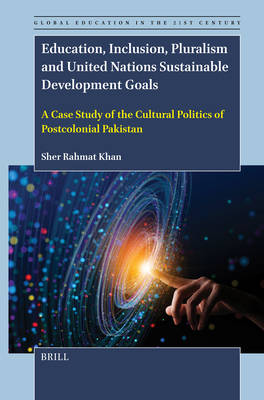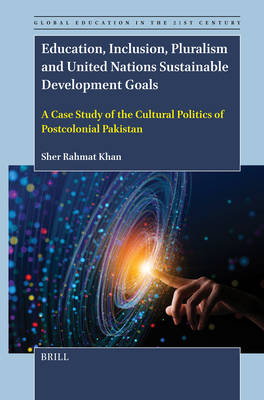
Bedankt voor het vertrouwen het afgelopen jaar! Om jou te bedanken bieden we GRATIS verzending (in België) aan op alles gedurende de hele maand januari.
- Afhalen na 1 uur in een winkel met voorraad
- In januari gratis thuislevering in België
- Ruim aanbod met 7 miljoen producten
Bedankt voor het vertrouwen het afgelopen jaar! Om jou te bedanken bieden we GRATIS verzending (in België) aan op alles gedurende de hele maand januari.
- Afhalen na 1 uur in een winkel met voorraad
- In januari gratis thuislevering in België
- Ruim aanbod met 7 miljoen producten
Zoeken
Education, Inclusion, Pluralism and United Nations Sustainable Development Goals
A Case Study of the Cultural Politics of Postcolonial Pakistan
Sher Rahmat Khan
€ 95,45
+ 190 punten
Omschrijving
This book offers a compelling analysis of education's promise to achieve inclusive, pluralistic and sustainable societies. These globally shared challenges are examined through a detailed analysis of the cultural politics of education in postcolonial Pakistan. The analysis provides a window into the ways that the intergenerational traumas of colonialism, neocolonialism, globalisation and forms of extremism continue to present significant challenges for postcolonial Pakistan. Drawing on postcolonial theories and curriculum theory, the author develops a critical discourse analysis of the cultural politics that shapes education in Pakistan. The analysis identifies key elements of this cultural politics such as religious and cultural dynamics, geopolitical challenges, the need to promote unity and cohesion, employing history for nation-building, and gender relations, and the ways in which these elements intersect to shape the possibilities of delivering on the promise of inclusion, pluralism and sustainable development.
Specificaties
Betrokkenen
- Auteur(s):
- Uitgeverij:
Inhoud
- Aantal bladzijden:
- 276
- Taal:
- Engels
- Reeks:
- Reeksnummer:
- nr. 10
Eigenschappen
- Productcode (EAN):
- 9789004719187
- Verschijningsdatum:
- 19/12/2024
- Uitvoering:
- Paperback
- Formaat:
- Trade paperback (VS)
- Afmetingen:
- 157 mm x 234 mm
- Gewicht:
- 403 g

Alleen bij Standaard Boekhandel
+ 190 punten op je klantenkaart van Standaard Boekhandel
Beoordelingen
We publiceren alleen reviews die voldoen aan de voorwaarden voor reviews. Bekijk onze voorwaarden voor reviews.









